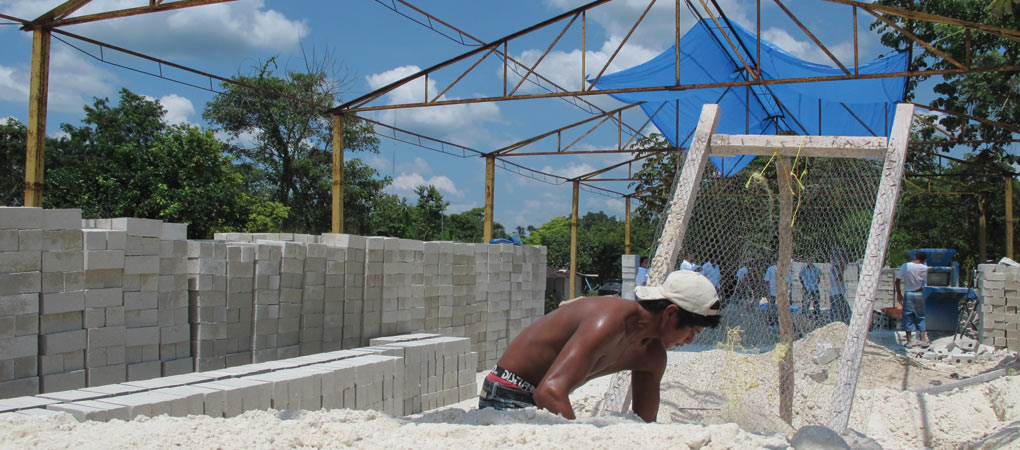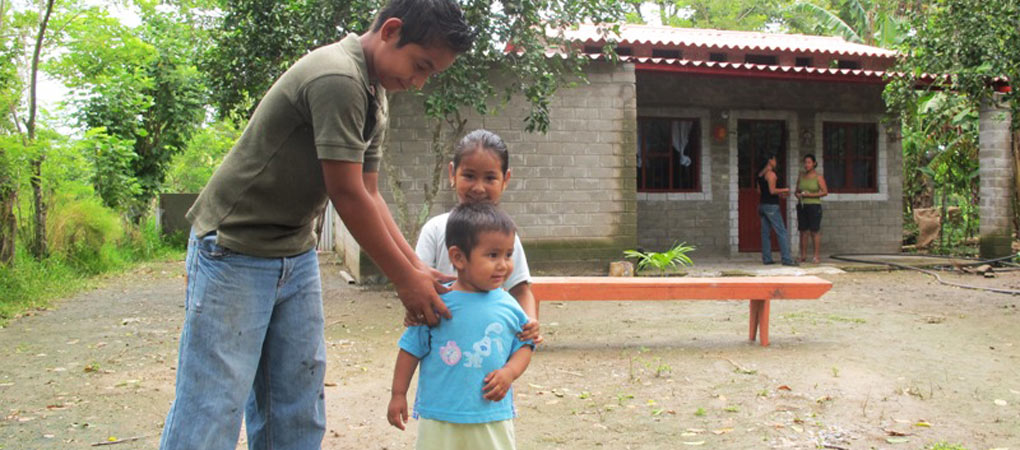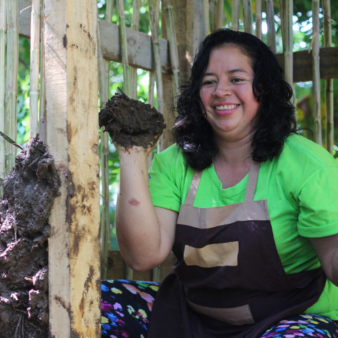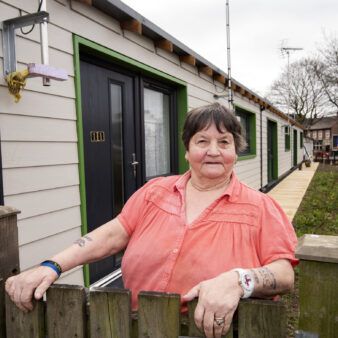The Calakmul Rural Housing Programme was initiated in 2004 by Échale a tu Casa, a social franchise programme developed by Ecoblock International. It aims to facilitate self-build processes in the Calakmul area of Campeche, by providing technical training and assistance as well as financial support to low-income rural families, and by facilitating collective organisation processes. Using Échale’s Adoblock building technology, the programme has supported the assisted self-build construction of 1,000 new homes as well as 1,610 home improvements, generating employment for 500 people. The approach is being scaled up via a social franchising model, whereby community leaders take on a supervisory role for self-build projects within a certain geographic region.
Project Description
Aims and Objectives
This project aims to address the acute housing issues of low-income rural families in the Calakmul area of Campeche, Mexico, by facilitating a self-build housing process with technical and financial innovation, while strengthening community ties.
Context
Calakmul is situated in the middle of the Calakmul biosphere reserve, the largest tropical forest reserve in Mexico. It is located in the Campeche state in southeastern Mexico and is famous for its magnificent Mayan ruins. It is an area of high marginalisation and rural families live in conditions of extreme poverty, with families comprising two to nine members and average household incomes of US$100 to US$150 per month. Deforestation of the protected biosphere reserve is a key problem in the area, with families relying on timber for fuel and housing construction.
Unable to access credit, families build their homes incrementally, as their time and savings permit, a housing process that is marked by poor planning, high waste, high costs and long completion times (10 – 15 years). The result is often homes that are costlier to build and as they cannot afford to hire professional contractors, the construction is often of poor quality, creating unsafe conditions for families.
Key Features
Échale a tu Casa is a social franchise programme developed by Ecoblock International, a company established in 1997 by social entrepreneur and Ashoka fellow Francesco Piazzesi. The company originally started as a not-for-profit organisation in 1987, but was changed to a for-profit structure with the aim of achieving greater social impact.
Échale a tu Casa supports a self-build approach that helps people in low-income communities of Mexico become homeowners. It focuses on strengthening their construction skills and supporting the creation of community-owned micro construction industries, on fostering sustainable community development through social housing production, and on providing low-income families with access to credit which, combined with their own savings and available government subsidies, allows them to build their own homes and pay for them slowly over time. In addition, it supports families by offering financial literacy classes, creating a community savings and loans facility, and partnering with government to extend families’ mortgages.
Échale a tu Casa initiated the Calakmul Rural Housing Programme in 2004 in order to provide homes for low-income rural families in the Calakmul area of Campeche. Échale facilitates the self-build process in this area by providing technical training and assistance as well as financial support to the communities. The key areas of work are: (1) technical training, (2) social organisation, (3) social franchising and (4) financial education.
Homes are built by the residents themselves under the guidance and training of Échale, and vary in size and design depending on the individual preferences and the local cultural context. They are built with Échale’s patented building technology, Adoblock, which serves as a natural insulation source and reduces reliance on heating and cooling devices. More than 90 per cent of each Adoblock is made from local soil, which reduces waste and the use of environmentally harmful materials. The blocks are produced with an Adopress, an easily operated machine developed by the CEO of the organisation, which Échale provides to community members. Échale furthermore provides payment for the labour that the families contribute to constructing their own homes.
A minimum of 30 families must organise themselves in order to take part in the project (50 families in the case of home improvement). Neighbours form work groups that jointly produce the building materials and lay the foundations for every new home in the community, thus achieving economies of scale whilst strengthening social relationships between families. The efficiency of this collaborative process reduces the average time for completing a home in these communities from several years to just two months.
Échale works with a range of national and regional governmental institutions, including the National Housing Commission (CONAVI), the Federal Mortgage Trust (SHF) and the Housing Institute of Campeche (INVICAM). It also works in partnership with local NGO Impulsac and with the Ashoka global association of social entrepreneurs.
What impact has it had?
- The project has assisted 2,610 low-income families in Calakmul, who are earning up to six times the minimum monthly wage, to build or renovate their homes, allowing them to access affordable housing finance and providing them with a safer living environment. It has furthermore generated employment for 500 people and has contributed towards greater social integration, with families working together to build their homes and manage all aspects of the project.
- The project includes environmental features which have helped to reduce the consumption of water and energy, contributing towards the preservation of the environment.
How is it funded?
Échale is structured as a multi-purpose financial company which operates as a financial intermediary to provide financing to consumers. Échale has designed a line of financial products to finance the purchase of self-build ‘kits’, which feature risk mitigation innovations such as a mandatory savings period, guarantors, and an electronic collection system. A partnership was furthermore established with Ashoka to create a new type of community fund known as a community financial society (SOFINCO), which allows families’ savings to be used as a financial guarantee to obtain government or commercial bank loans. Each family that deposits savings into the Social Fund is effectively buying shares in the fund, which incentivises the families themselves as well as the elected housing committee to manage the fund prudently.
The total cost for the Calakmul project was US$16.1 million, of which US$10 million for new housing construction (US$10,000 per housing unit) and US$6.1 million for home improvements (US$3,800 per housing unit). In the case of new housing construction, residents provide a US$1,000 (10 per cent) down payment and the remaining costs are funded through a combination of federal subsidy (US$4,167) and credit (US$4,833) provided through the Social Fund, repayable over 10 years with interest rates of 8 to 11 per cent. Ecoblock International makes a profit of 8.5 per cent on each house, after deducting costs for the provision of social and technical assistance, materials, labour, tools and machinery, and administration costs.
Why is it innovative?
- Technical innovation: development of the Adopress and Adoblock construction technology.
- Environmental sustainability: integrating a range of water and energy saving features in addition to environmentally friendly building materials, as well as using solar energy and working to reduce deforestation.
- Housing finance innovation: developing a Social Fund to provide credit directly to families, combining the loans with savings and available government subsidies.
- Social franchising model: communities that already have self-built homes assist and train other communities in the process, with a view to scaling up the approach.
- For-profit approach: operating as a business in order to ensure financial sustainability and achieve greater impact.
What is the environmental impact?
The houses were built using Adoblock, a stabilised compressed earth block mainly made from local, non-fertile soil (90 per cent) mixed with water and cement. It is 30-40 per cent more resistant than traditional fired bricks or concrete blocks, has excellent acoustic properties and acts as a natural insulation source, hence reducing reliance on heating and cooling devices. The blocks are produced locally by the residents using the Adopress machine. Adoblock is generally only used in the programme’s new-build housing or home extension projects.
The project has helped to avoid further deforestation within the Calakmul Biosphere Reserve area by offering alternative building materials and reducing the amount of wood needed by families for fuel, construction and other purposes.
The Échale homes include a range of environmental features, including rainwater harvesting systems (reducing mains water use by 20 per cent), bio digesters which produce fertiliser and methane gas, wood conserving stoves, solar water heaters, and solar low-energy light bulbs (reducing the use of mains electricity by 10 per cent).
Is it financially sustainable?
The programme enables families on low incomes to have access to credit and have a completed home within months, rather than having to save and build incrementally over a period of many years.
Residents are paid for their labour, with the costs of their work included in the overall project costs. Some of them have gone on to produce Adoblock commercially (with Ecoblock International as the financial intermediary) and 500 jobs were created through the Calakmul programme. The homes built through the programme furthermore offer good resale value.
Échale’s activities are carried out on a for-profit basis, with the costs of training, rental of machinery and technical assistance paid for by communities as part of the project costs. In terms of competitive advantage, Échale has a competitive price advantage as well as holding a patent for the Adopress equipment that is used to make the Adoblock.
Échale has developed its Social Fund and social franchising programme in order to be able to scale up its approach without having to rely on funding from government or philanthropic organisations. Through the social franchise model, the franchise becomes a business for the community member(s) taking it forward, with Échale receiving two per cent of the income from each franchisee. Five franchises have been set up to date.
What is the social impact?
Échale works with rural families living in precarious conditions and in need of adequate housing, providing support in the construction of homes that offer a safe and secure environment, and building social capital within communities. It is designed to bring community organization to the common practice of self-build in rural areas by organising the community into Social Housing Production Units (SHPUs), a group made of community members and homeowners responsible for the implementation of the self-build process. All construction work is carried out collectively, with neighbours pooling their labour to help each other build their homes.
Échale’s approach involves the creation of a housing committee, which holds regular meetings and is tasked with developing the housing programme, interacting with other stakeholders and replicating the social franchise. The social franchise replication model is community-based, with local leaders taking on supervisory roles over multiple community construction projects in exchange for a commission.
The programme also provides training and technical support to families in the local production of Adoblocks and the self-help construction and/or improvement of their homes. Échale also teaches community members to service the bio digesters, maintain the solar PV and sewage systems and repair any broken walls, as well as provides financial literacy courses to families.
Barriers
- The major barrier is the cost of financing as the target population has difficulty in accessing credit for housing construction. The programme has worked to overcome this by creating a Social Fund to offer loans directly to families at more reasonable interest rates than they would otherwise have access to and developing the social franchising model to enable the other communities to benefit from the approach.
- A lack of access to financing with reasonable interest rates has also been identified as the biggest barrier to the international transfer of the project.
- Families must own the land on which they are building to take part in the programme. In a small number of cases Échale has helped families purchase land.
Lessons Learned
- In order to have greater social impact, it was important for Échale to become a for-profit business, with a business plan, clear goals and targets, proper accounting, and competitive salaries.
- Building sustainable human habitats and housing wealth creation in communities equals better affordable housing, community cohesion, environmental protection, jobs and economic growth. The key to achieving this is an approach based on principles of social inclusion, financial education, technical assistance and social financing.
Evaluation
Whilst no formal monitoring or evaluation has been carried out on the project as yet, the positive impact of the improved housing conditions is evident.
Transfer
The Calakmul programme began with a pilot project of 250 homes in 2010 and is now being completed, with the construction of 1,000 new homes and improvement of 1,610 homes. The wider Échale approach has assisted the self-help construction of approximately 26,000 new homes and 50,000 home improvements in Mexico since it first began its not-for-profit activities in 1985.
In order to scale the model, Échale has developed a social franchise model whereby community leaders with whom Échale has worked in the past will take on a supervisory role for self-build projects within a certain geographic region. The organisation has begun piloting this social franchise model in the states of Aguascalientes and San Luis Potosi, with five franchises set up to date and more expected to be implemented in the next two to three years.
The National Housing Commission (CONAVI) has certified private companies and NGOs to disperse subsidies and the Federal Mortgage Trust (SHF) has provided a line of credit for self-build housing to certified financial intermediaries, both of which help to facilitate the Échale approach.
The Calakmul project has received many international visitors and Échale’s approach has begun to be transferred internationally, including in Venezuela, Nicaragua and Haiti. Pilot housing schemes are due to be carried out in Haiti and Honduras in 2012.




